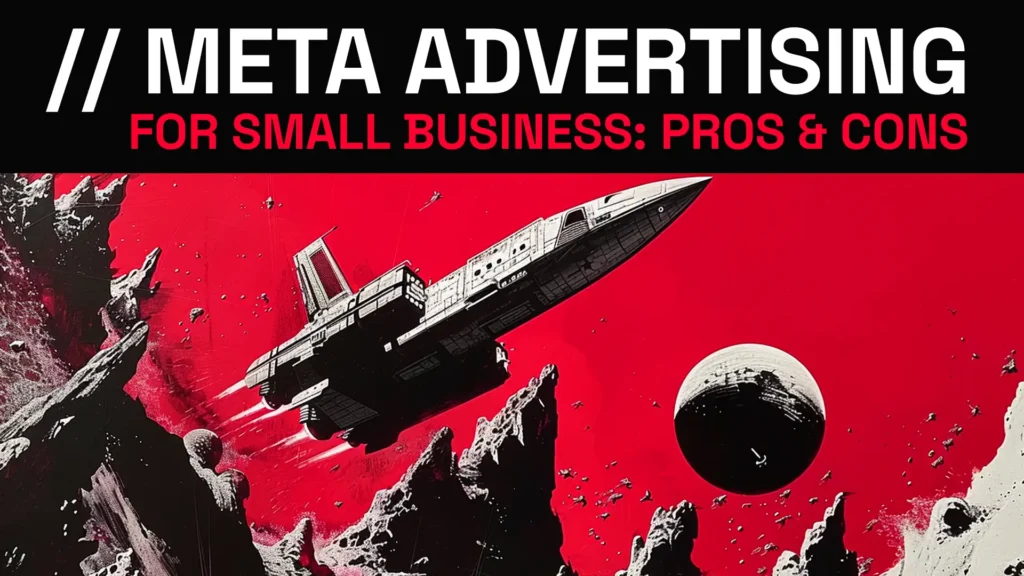TAKE YOUR BUSINESS TO THE NEXT LEVEL
Let us take marketing off your plate. Visit our pricing to learn more about working with Next Level.

As a small business owner, you have a variety of advertising options to choose from in today’s digital landscape. One well-established platform is Meta, formerly known as Facebook. In this article, we’ll explore the advantages and disadvantages of using Meta advertising for small businesses, particularly those operating in local markets with budget constraints.
One of the benefits of Meta ads is the ability to target your audience based on various factors. For example, if you’re an HVAC contractor in a bustling city, you can target homeowners within a specific radius of your business. Meta allows you to target your ads based on demographics, interests, behaviors, and location.
By focusing on people who live nearby and have shown interest in home improvement or HVAC services, you can increase the chances of reaching potential customers. However, it’s important to note that while targeting can be effective, it’s not a guarantee of success.
Meta ads can be a cost-effective choice for small businesses with limited funds. You only pay when someone clicks on your ad, thanks to the pay-per-click (PPC) model. This means you have control over your spending and can avoid overspending on ads that don’t deliver results.
With Meta ads, you can set daily or lifetime budgets, ensuring you stay within your advertising budget. This level of control is valuable for small businesses that need to be mindful of their ad expenses.

Meta offers a range of ad formats to suit different business goals and target audiences. These include image ads, video ads, carousel ads, and story ads. This variety allows small businesses to experiment with different formats and find what works best for their specific products or services.
For example, an HVAC contractor could use video ads to showcase their services and explain the benefits of regular maintenance, while a local boutique could use carousel ads to highlight their latest collection. By leveraging different ad formats, small businesses can create engaging content that captures their audience’s attention.

While Meta ads offer benefits, they also come with a learning curve. The platform’s interface and ad tools can be challenging for small business owners who are new to digital advertising. It takes time and practice to become proficient in creating and managing effective ad campaigns.
To create successful ads, you’ll need to understand how to set up campaigns, choose the right objectives, target the appropriate audience, and design compelling ad creatives. This process can be time-consuming and may require some trial and error.
As Meta ads have become more popular, competition for ad space has increased. Small businesses are now competing not only with other local businesses but also with larger corporations with more substantial advertising budgets. This can lead to higher costs-per-click and make it more challenging to stand out in a crowded online space.
To succeed in this competitive environment, small businesses need to create targeted, compelling ads that resonate with their ideal audience. This requires a deep understanding of your target market and the ability to craft messages that grab their attention.
Meta is a constantly evolving platform, with frequent updates to its advertising tools, policies, and best practices. Staying up-to-date with these changes can be time-consuming and challenging for small business owners who are already juggling multiple responsibilities.
Moreover, changes to Meta’s algorithms can impact the performance of ads, requiring small businesses to continually adapt their strategies. This ongoing maintenance and optimization can be a significant drain on time and resources.
Meta ads have both pros and cons for small businesses looking to advertise in local markets. While the platform offers targeting capabilities, budget control, and a variety of ad formats, it also comes with a learning curve, competition challenges, and the need to stay current with an ever-evolving platform.
Ultimately, whether Meta ads are right for your small business depends on your specific goals, target audience, and available resources. By carefully considering the pros and cons and investing time in learning best practices, small businesses can leverage Meta ads as part of their overall advertising strategy.
Let us take marketing off your plate. Visit our pricing to learn more about working with Next Level.